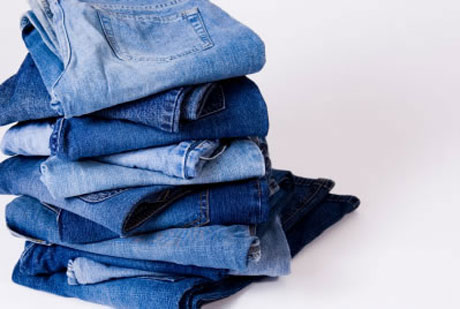(单词翻译:单击)
情景对话
Todd: Before musicians like you said used to wear ripped jeans. Jeans with big holes or rips in them.
托德:你之前说过,以前的音乐人喜欢穿破洞牛仔裤。就是那种有破洞的牛仔裤。
Mariel: Oh, yeah, that was in the 80's.
玛丽埃尔:对,那是上世纪80年代的事了。
Todd: OK, maybe that was my generation. So that's not popular anymore?
托德:那可能是我的年代。那现在破洞牛仔裤不再流行了吗?
Mariel: Some people like to wear ripped jeans, yeah, still, but mainly the rips are quite neat, so they're usually ripped a little bit around the pockets or around the cuffs, you know the bottoms, Yeah
玛丽埃尔:现在也还有人喜欢穿破洞牛仔裤,不过大部分破洞很整齐,一般破洞的位置在裤兜和裤脚附近。
Todd: OK, yeah. That sounds like designer jeans. Maybe then like.... are they specifically made just for that style?
托德:好。听起来像设计师品牌的牛仔裤。也许……那是刻意做出这种样式的吗?
Mariel: Well, yeah. Actually, quite often the jeans you buy in the store are already ripped or already worn so they look like they're old but they are brand new.
玛丽埃尔:对。实际上,你在商场里买的破洞牛仔裤都会做旧,看起来像旧的,但其实是新的。
Todd: But designer jeans can be really expensive, right?
托德:但是设计师品牌的牛仔裤非常贵,对吧?
Mariel: Oh, they can be very expensive but people are willing to pay the money because they're designer jeans. They're cool.
玛丽埃尔:是很贵,但是人们愿意花钱买,因为那些是设计师品牌的牛仔裤,非常酷。
Todd: Well, how much do you pay for jeans?
托德:你一般会花多少钱买牛仔裤?
Mariel: I can pay up to 120 Euros for jeans.
玛丽埃尔:我最多可以花120欧元买牛仔裤。
Todd: A hundred and twenty Euros.
托德:120欧元。
Mariel: Yeah.
玛丽埃尔:对。
Todd: That's a lot of money.
托德:那是一大笔钱啊。
Mariel: It's a lot of money, yeah, especially because I'm a student but I'm willing to put the money into it if the jeans fit very well.
玛丽埃尔:的确是很多钱,尤其我还是个学生,不过如果合身的话,我愿意在牛仔裤上花钱。
Todd: Just, lastly about jeans, these days there's many different colors. You have the light blue jeans, or the darker blue jeans. Which colors do you like to wear?
托德:最后一个有关牛仔裤的问题,最近的牛仔裤有很多颜色。有浅蓝色牛仔裤,深蓝色牛仔裤。你喜欢穿哪种颜色的牛仔裤?
Mariel: That depends on the time of the year actually. In the summer I like to wear light blue jeans and then in the winter I sometimes wear black jeans or really dark blue jeans.
玛丽埃尔:这要取决于时节。夏天我喜欢穿浅蓝色牛仔裤,冬天我会穿黑色或深蓝色牛仔裤。
Todd: Oh, that's interesting. So you change the color by season?
托德:哦,有意思。你是根据季节更换颜色吗?
Mariel: Yeah, generally I think I wear more darker clothes in the winter.
玛丽埃尔:对,我冬天一般会穿深色。
Todd: Well, just off hand, how many jeans do you think you have? How many pairs do you have at home?
托德:问个刚想到的问题,你有多少条牛仔裤?你家里有多少条牛仔裤?
Mariel: I think I have about eight or nine pairs.
玛丽埃尔:我想我大概有八九条牛仔裤。
Todd: That's a lot.
托德:那很多了。
Mariel: That's a lot but actually, I use only two pairs of them.
玛丽埃尔:是挺多的,不过我一般只穿其中的两条。
Todd: Your favorites?
托德:那两条是你的最爱?
Mariel: Yeah, my favorite jeans. And they're baggy.
玛丽埃尔:对,我最喜欢的牛仔裤。是宽松牛仔裤。
Todd: OK, thanks Mariel.
托德:好,谢谢你,玛丽埃尔。
Mariel: You're welcome. My pleasure.
玛丽埃尔:不客气。我很荣幸。

译文属可可原创,仅供学习交流使用,未经许可请勿转载
重点讲解
重点讲解:
1. used to do sth. 过去常常;过去曾;
例句:Markused tobe a pilot on the Mississippi River.
马克曾在密西西比河上当过领航员。
2. brand new 崭新的;簇新的;
例句:We are now entering abrand newera.
我们正进入一个崭新的时代。
3. be willing to do sth. 乐意的;愿意的;
例句:Iamquitewilling tolisten to your report.
我很乐意去听你的报告。
4. depend on 取决(于);有赖(于);
例句:Whether we are outdepend onthe weather.
我们明天是否外出取决于天气。
5. off hand 马上;立即;无需询问(或查证);
例句:I can't think of anyoff hand.
我现在一个也想不出来。


